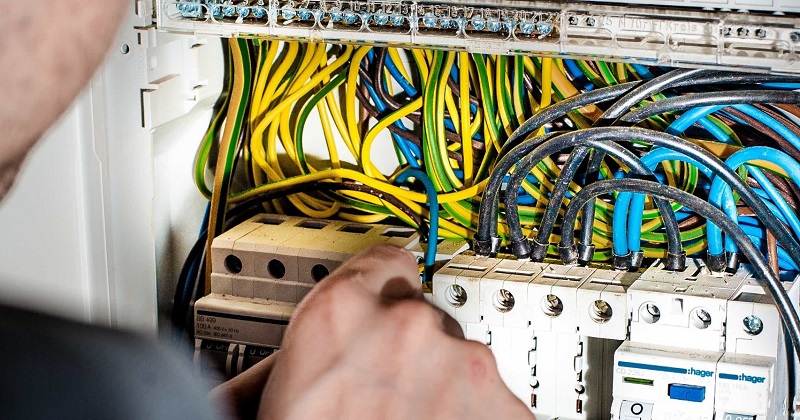Are you considering a career as a master electrician, or perhaps curious about how their earnings stack up against other skilled trades? As the demand for electrical expertise continues to grow, so does the average salary of these specialized professionals.
In this blog post, Derosa Electric will delve into the details surrounding master electrician salaries in the United States – from factors that influence pay rates to an overview of potential benefits and job satisfaction.
Key Takeaways
- Master electricians are highly skilled professionals who design, install, repair, and maintain complex electrical systems in residential, commercial, and industrial settings.
- The average annual salary range for master electricians across the United States is between $60,000 to $90,000. Factors such as location (states with higher costs of living usually offer higher salaries), experience, and education level can all impact pay rates.
- Master electricians enjoy a variety of benefits including health insurance coverage; retirement savings plans like pensions or 401(k)s; paid time off for vacations and holidays; career advancement opportunities that allow them to take on supervisory roles or establish their own contracting businesses; and ongoing professional development through technical training courses and continuing education opportunities.
Understanding Master Electrician Salaries
To understand master electrician salaries, it’s important to first define the role of a master electrician and explore the factors that can affect their pay such as experience, location, industry demand, and union affiliation.
Defining The Role Of A Master Electrician
A master electrician is an experienced professional with exceptional expertise in the electrical trade, taking on complex tasks that require a high level of skill and precision.
These individuals possess extensive knowledge of electrical systems and have successfully navigated the rigorous process of obtaining licensure to become recognized as industry leaders.
The daily responsibilities of a master electrician may include reading blueprints or schematics to ensure proper installation; adhering to local building codes; supervising teams of junior electricians or apprentices; troubleshooting advanced electrical issues; estimating project costs; upgrading outdated wiring systems; implementing safety protocols; collaborating with architects, engineers, and other construction professionals.
Exploring The Factors That Affect Salaries
There are several factors that can impact the salary of a Master Electrician. Firstly, experience and education play a significant role in determining pay rates.
Another major factor that impacts pay rates is location. The cost of living and demand for electricians vary widely across states and regions, which can lead to significant variations in salaries.
Aside from experience, education, and location, another important factor affecting salaries is union membership.
Ultimately, there is no one-size-fits-all answer when it comes to Master Electrician salaries – they are influenced by numerous unique factors that vary from person to person.
Requirements For Becoming A Master Electrician
To become a master electrician in the United States, you must meet certain requirements. These include:
- Completing High School: A high school diploma or GED equivalent is typically required to start an apprenticeship program.
- Completing an Apprenticeship Program: To become a master electrician, you must complete an apprenticeship program that typically lasts four to five years. The apprenticeship includes both classroom training and hands-on experience.
- Obtaining a Journeyman License: After completing the apprenticeship program, you must obtain a journeyman license by passing a state-administered exam.
- Gaining Work Experience: Many states require master electricians to have several years of work experience as a journeyman electrician before they can apply for a master’s license.
- Passing the Master Electrician Exam: Once you have completed the necessary work experience, you can take the master electrician exam to obtain your license.
- Continuing Education: To maintain your master electrician license, you will be required to complete continuing education courses each year.
Meeting these requirements ensures that individuals have the necessary technical knowledge and practical skills needed to perform electrical work safely and effectively.
Average Salaries For Master Electricians Across The US
The national average salary range for master electricians is between $60,000 and $90,000 per year, depending on experience and location. Salaries can vary significantly by state and industry, with Maryland, Texas, Wisconsin, Colorado, and New York City being the top-paying states for electricians.
National Average Salary Range
The national average salary range for master electricians can vary depending on factors such as experience, location, and industry. The table below outlines the average salaries for master electricians in the United States.
| Percentile | Annual Salary |
|---|---|
| 10th Percentile | $53,000 |
| 25th Percentile | $60,000 |
| Median (50th Percentile) | $70,000 |
| 75th Percentile | $82,000 |
| 90th Percentile | $95,000 |
Keep in mind that these figures are national averages and can fluctuate based on the specific factors mentioned earlier. Nevertheless, this data provides a useful benchmark to understand the earning potential of a master electrician in today’s competitive job market.
Variations In Salary By State And Industry
Master electrician salaries vary widely based on location and industry. In general, states with higher costs of living tend to offer higher salaries to master electricians. For instance, the average annual salary for a master electrician in New York City is around $86,000 compared to $68,000 in Texas.
In addition to state-by-state variations, different industries also pay differently for master electricians. Unionized jobs typically offer higher wages and better benefits than non-union jobs. For example, the International Brotherhood of Electrical Workers (IBEW) represents many master electricians working in the electrical industry. Other industries that often have high-paying positions for master electricians include construction and manufacturing.
Comparison With Other Skilled Trades
Master electricians are one of several skilled trades that require extensive training and hands-on experience. Compared to other skilled trades, such as plumbing or HVAC technicians, master electricians tend to have a higher average salary due to the complexity of their work and the demand for their services. However, salaries can still vary depending on location and industry.
For example, in Maryland and Texas, master electricians typically earn an annual salary ranging from $60,000 to $80,000 per year. In unionized industries like IBEW (International Brotherhood of Electrical Workers), wages may be even higher due to negotiated rates. Other states like Wisconsin and Colorado offer lower salaries with an average yearly pay between $40,000-$50,000 for experienced master electricians. Overall though, becoming a master electrician offers ample earning potential compared to other skilled trade jobs while also providing job stability in an essential industry.
Job Benefits And Perks For Master Electricians
Master electricians enjoy a range of benefits and perks, including health insurance and retirement benefits, paid time off and holidays, career advancement opportunities, as well as technical training and professional development.
Health Insurance And Retirement Benefits
Master electricians typically enjoy a range of job benefits and perks. In addition to competitive salaries, many employers offer comprehensive health insurance and retirement benefits. Here are some of the key benefits that master electricians may expect:
- Health Insurance: Many employers provide health insurance coverage for their employees, including master electricians. This can include medical, dental, and vision insurance plans. Some companies also offer wellness programs that encourage healthy lifestyles.
- Retirement Savings Plans: Many employers offer retirement savings plans such as 401(k)s or pensions. Master electricians can contribute a portion of their salary to these plans on a tax-deferred basis, allowing them to save for retirement while reducing their taxable income.
- Paid Time Off Master electricians often receive paid time off for vacations and holidays. Employers may also offer sick leave or personal days for unexpected absences.
- Career Advancement Opportunities: Master electricians have opportunities to advance in their careers, taking on supervisory roles or starting their own electrical contracting businesses. With additional training and education, they may become electrical engineers or project managers.
- Professional Development: As technology advances and electrical codes change, ongoing professional development is important for master electricians to stay current in their field. Many electrical trade associations offer technical training courses and continuing education opportunities.
As with any profession, the actual benefits offered will vary by employer and location. It’s always a good idea to explore the specific job benefits available before accepting a position as a master electrician.
Paid Time Off And Holidays
Master electricians typically receive a variety of benefits, including paid time off and holidays. Here are some of the common benefits that electricians can expect to enjoy:
- Vacation Time: Most companies offer their employees paid vacation time, which can range from one to four weeks per year. This gives master electricians the opportunity to take a break from their duties and recharge.
- Sick Days: In addition to vacation time, many employers offer sick days that allow master electricians to take time off when they are ill without having to worry about lost wages.
- Holidays: Many companies also provide paid holidays, such as Christmas Day, Thanksgiving Day, and Labor Day. This gives master electricians the opportunity to spend time with their families and friends while still receiving their regular pay.
- Other Benefits: Depending on the employer, master electricians may also receive additional benefits like health insurance, dental insurance, vision insurance, retirement plans, and more.
Having these benefits not only makes working as a master electrician more attractive salary-wise but also promotes job satisfaction and overall well-being for the individual worker.
Career Advancement Opportunities
For master electricians, there are plenty of career advancement opportunities available to those who possess the necessary skills and qualifications. Some may choose to specialize in a specific field within electrical work, such as solar or HVAC systems, while others may opt for roles that focus on project management.
One of the best ways to continue advancing in this profession is by pursuing further education and training. Many community colleges and trade schools offer courses on advanced electrical concepts, as well as specialized certifications like LEED or NABCEP credentials.
Union membership through organizations like IBEW can also lead to additional job opportunities with higher salaries and increased benefits packages.
Technical Training And Professional Development
Master electricians are expected to stay up-to-date with the latest industry developments, and continually expand their knowledge and skills. This is why technical training and professional development opportunities are crucial for those pursuing a career in this field.
There are many ways for master electricians to continue learning, including apprenticeships, on-the-job training, college courses, seminars and workshops. Some organizations also offer online courses which allow individuals to learn from anywhere.
Additionally, professional associations like the Independent Electrical Contractors (IEC) or International Brotherhood of Electrical Workers (IBEW) offer resources such as mentoring programs and networking events enabling these professionals to build meaningful relationships with peers in the industry while enhancing their continuing education efforts.
Is Pursuing A Career As A Master Electrician Worth It?
Pursuing a career as a master electrician can be both financially rewarding and personally satisfying, with the potential for long-term job stability and opportunities for advancement.
But before making any decisions, it’s important to weigh the pros and cons of this skilled trade.
Pros And Cons Of Being A Master Electrician
Pros:
- High Earning Potential: Master electricians can earn a good salary, especially those with vast experience and expertise.
- Job Security: Electricians are in high demand, and master electricians have job security as they are more qualified than regular electricians.
- Career Advancement: Master electricians have opportunities for advancement and can become supervisors or business owners.
- Varied Work: Electricians do not work in cubicles as they work on different projects every day, which means no monotony.
- Independence: An independent contractor but possibly an even better option is starting an electrical contracting business.
Cons:
- Physical Demands: Electrical work requires standing for long hours, working outdoors, and carrying heavy equipment which can be taxing on the body.
- Risk of Injury: Working with electricity poses a significant risk of injury or death; hence safety protocols must be strictly adhered to.
- Long Hours: Electrical work requires working extended periods and possibly being called in during emergencies or weekends.
- Competitive Industry: The electrical industry is competitive; hence it may require a lot of marketing to get contracts or steady jobs.
- Training and Certification Requirements: To become a master electrician requires extensive training and certification requirements that may take years to complete.
Long-Term Earning Potential And Job Stability
One of the most attractive aspects of pursuing a career as a Master Electrician is its long-term earning potential and job stability. Since the electrical industry is an essential part of every community’s infrastructure, there will always be a need for skilled professionals to perform installation, repairs, and maintenance.
Moreover, with experience and additional certifications or licenses under their belt, Master Electricians can expect to earn higher salaries. The National Electrical Contractors Association reports that experienced electricians who hold master electrician licenses have median earnings ranging from $74k-$90k per year in the United States.
Conclusion And Final Thoughts.
In conclusion, becoming a master electrician can be a lucrative career path for those interested in the electrical industry. Salaries do vary greatly depending on location and industry, with the national average ranging from around $50k to over $100k per year.
Additionally, benefits such as health insurance, retirement plans, and career advancement opportunities can make this profession even more appealing. However, it’s important to consider the potential hazards of working with electricity and ensure proper safety measures are taken at all times.
FAQs:
1. What is the average salary range for a master electrician?
According to recent data, the average salary range for a Master Electrician in the United States can vary depending on location and experience level. However, it typically falls between $60,000 – $100,000 per year.
2. What factors affect the salary of a master electrician?
Several factors can impact a Master Electrician’s salary including years of experience working in the field, additional certifications or training completed beyond their initial license requirements, and demand for skilled workers in certain areas.
3. How much does education play into a Master Electrician’s earnings potential?
While formal education beyond licensure may not be required to become an electrician or even obtain certification as many learn their craft through apprenticeships with licensed professionals but obtaining additional qualifications such as an Associates Degree from a technical school or a University degree can boost earning potential
4. Are there any other benefits associated with becoming a master electrician aside from compensation?
Becoming a master electrician opens up more career opportunities compared to those who are just starting out in this industry which means better job security & networking avenues available while gaining respect from colleagues due to being considered an expert within your trade. Additionally – some employers provide employee perks such as health insurance coverage options (dental/vision), and retirement plans/401k accounts which contribute towards overall financial stability throughout a lifetime spent working within a particular occupation area.






